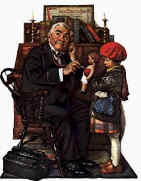
Comprehensive information on DHA. Low levels of DHA associated with ADHD in children and depression and Alzheimer's Disease in adults. Learn about the usage, dosage, side-effects of DHA.
Overview
Docosahexaenoic acid (DHA) is an omega-3 fatty acid that is essential for the proper functioning of our brains as adults, and for the development of our nervous system and visual abilities during the first six months of life. Lack of sufficient DHA may be associated with impaired mental and visual functioning as well as attention-deficit hyperactivity disorder (attention deficit/hyperactivity disorder (ADHD)) in children. Low levels have also been associated with depression and Alzheimer's Disease in adults. Our bodies naturally produce some DHA, but in amounts too small and irregular to ensure proper biochemical functioning. Therefore, preformed DHA must be consumed in the diet through foods such as cold water fatty fish or in supplement form in order to assure an adequate supply.
DHA Uses
DHA for ADHD (Attention-Deficit Hyperactivity Disorder)
Research has identified the impact of low DHA levels on attention deficit/hyperactivity disorder (ADHD) (and possibly other learning, health, and sleep problems) in children. However, studies have not yet been conducted to determine whether supplementation with DHA is useful for the prevention or treatment of these conditions.
DHA for depression
Insufficient DHA may be related to increasing rates of depression in adults. More research is warranted to confirm the possible association between DHA and depression and to investigate whether DHA supplements may be of benefit in depressed patients.
DHA for Heart Disease
DHA supplementation enhanced the DHA status of vegetarians and favorably influenced cholesterol levels. Because people with diabetes often develop heart disease, some diabetics may benefit from omega-3 fatty acid supplementation (including DHA).
DHA for Infant Development
DHA plays a crucial role in the growth and development of the central nervous system as well as visual functioning in infants. Nutrition experts have issued recommendations that pregnant and lactating women should consume 300 mg per day of DHA. Adequate intakes for infants on formula diets should be 0.35% DHA.
DHA for Other Conditions
Some experts believe that omega-3 fatty acids (in the form of eicosapentaenoic acid (EPA) and DHA) may reduce inflammation and promote wound healing in burn victims and may also prove to be valuable in preventing colon cancer or treating it in its early stages. In addition, obese people who follow a weight loss program achieve better control over their blood sugar and cholesterol levels when fatty fish containing EPA and DHA is a staple in the diet.
Dietary Sources of DHA
DHA is found in cold water fatty fish including wild salmon (not farm raised), tuna (bluefin tuna have up to five times more DHA than other types of tuna), mackerel, sardines, shellfish, and herring. Some organ meats such as liver and brain are also a good source of this essential fatty acid, and eggs provide some DHA, but in lower amounts. For infants, breast milk contains significant amounts of DHA, while infant formula often has none (see above for the amount that should be present).
Available Forms
DHA is available as a supplement in two common forms:
- Fish oil capsules (which contain both DHA and EPA [eicosapentaenoic acid], another omega-3 fatty acid)
- DHA extracted from algae (which contains no EPA)
How to Take DHA
Recommendations for adequate intake put forth by the International Society for the Study of Fatty Acids and Lipids (ISSFAL) appear below.
Pediatric
- Infants that are breastfed should receive sufficient amounts of DHA if the mother has an adequate intake of this fatty acid.
- ISSFAL recommends that formula for infants contain 0.35% DHA.
Adult
- Pregnant and lactating women, per ISSFAL, should consume 300 mg/day of DHA
- The adequate daily intake of DHA for other adults should be at least 220 mg/day
- Therapeutic recommendations from diet: 2 to 3 servings of fatty fish per week, which corresponds to 1,250 mg EPA and DHA per day
- Fish oil supplements: 3,000 to 4,000 mg standardized fish oils per day, which is the equivalent of 2 to 3 servings of fatty fish per week
- Algal-derived DHA supplements: 200 mg per day
Some commercial products may also contain vitamin E to maintain freshness. For supplements, follow the directions on product labels for both dosage information and storage requirements; some products require refrigeration. Do not use products beyond their expiration date.
Precautions
Fish oil capsules contain both DHA and EPA. Supplements containing EPA may not be recommended for infants or small children because they upset the balance between DHA and EPA during early development. This suggests that pregnant women should also be cautious about taking fish oil supplements. These effects may be avoided by using DHA supplements derived from algae sources, which do not contain EPA.
Fish oil capsules may be associated with side effects such as loose stools, abdominal discomfort, and unpleasant belching. In addition, they may prolong bleeding time slightly; therefore, people with bleeding disorders or those taking blood-thinning medications should discuss the use of fish oil capsules with their healthcare providers before taking them. Consumption of fish oil supplements may also increase antioxidant requirements in the body. Taking extra vitamin E along with these supplements may be warranted; again, please consult your healthcare provider.
Possible Interactions
Aspirin
In combination with aspirin, omega-3 fatty acids could be helpful in the treatment of some forms of coronary artery disease. Consult your healthcare provider about whether this combination would be appropriate for you if you have coronary artery disease.
Cyclosporine
Omega-3 fatty acids may reduce some of the side effects associated with cyclosporine therapy, which is often used to reduce the chances of rejection in transplant recipients. Consult your healthcare provider before adding any new herbs or supplements to your existing medication regimen.
Reserpine and Nonsteroidal Anti-inflammatory Drugs
In an animal study, omega-3 fatty acids protected the stomach against ulcers induced by reserpine and nonsteroidal anti-inflammatory drugs (NSAIDs) such as indomethacin. Consult your healthcare provider before using omega-3 fatty acids if you are currently taking these medications.
back to: Supplement-Vitamins Homepage
Supporting Research
Albert CM, Hennekens CH, O'Donnell CJ, et al. Fish consumption and risk of sudden cardiac death. JAMA. 1998;279(1):23-28.
Al-Harbi MM, Islam MW, Al-Shabanah OA, Al-Gharably NM. Effect of acute administration of fish oil (omega-3 marine triglyceride) on gastric ulceration and secretion induced by various ulcerogenic and necrotizing agents in rats. Food Chem Toxicol. 1995;33(7):555-558.
Ando H, Ryu A, Hashimoto A, Oka M, Ichihashi M. Linoleic acid and alpha-linolenic acid lightens ultraviolet-induced hyperpigmentation of the skin. Arch Dermatol Res. 1998;290(7):375-381.
Andreassen AK, Hartmann A, Offstad J, Geiran O, Kvernebo K, Simonsen S. Hypertension prophylaxis with omega-3 fatty acids in heart transplant recipients. J Am Coll Cardiol. 1997;29(6):1324-1331.
Angerer P, von Schacky C. n-3 polyunsaturated fatty acids and the cardiovascular system. Curr Opin Lipidol. 2000;11(1):57-63.
Anti M, Armelau F, Marra G, et al. Effects of different doses of fish oil on rectal cell proliferation in patients with sporadic colonic adenomas. Gastroenterology. 1994;107(6):1892-1894.
Appel LJ. Nonpharmacologic therapies that reduce blood pressure: a fresh perspective. Clin Cardiol. 1999;22(Suppl. III):III1-III5.
Arnold LE, Kleykamp D, Votolato N, Gibson RA, Horrocks L. Potential link between dietary intake of fatty acid and behavior: pilot exploration of serum lipids in attention-deficit hyperactivity disorder. J Child Adolesc Psychopharmacol. 1994;4(3):171-182.
Aronson WJ, Glaspy JA, Reddy ST, Reese D, Heber D, Bagga D. Modulation of omega-3/omega-6 polyunsaturated ratios with dietary fish oils in men with prostate cancer. Urology. 2001;58(2):283-288.
Badalamenti S, Salerno F, Lorenzano E, et al. Renal effects of dietary supplementation with fish oil in cyclosporine-treated liver transplant recipients. Hepatol. 1995;22(6):1695-1701.
Baumgaertel A. Alternative and controversial treatments for attention-deficit/hyperactivity disorder. Pediatr Clin of North Am. 1999;46(5):977-992.
Belluzzi A, Boschi S, Brignola C, Munarini A, Cariani C, Miglio F. Polyunsaturated fatty acids and inflammatory bowel disease. Am J Clin Nutr. 2000;71(suppl):339S-342S.
Belluzzi A, Brignolia C, Campieri M, Pera A, Boschi S, Miglioli M. Effect of an enteric-coated fish-oil preparation on relapses in Crohn's disease. New Engl J Med. 1996;334(24):1558-1560.
Birch EE, Garfield S, Hoffman DR, Uauy R, Birch DG. A randomized controlled trial of early dietary supply of long-chain polyunsaturated fatty acids and mental development in term infants. Dev Med Child Neurol. 2000;42(3):174-181.
Bjerve KS, Brubakk AM, Fougner KJ, Johnsen H, Midthjell K, Vik T. Omega-3 fatty acids: essential fatty acids with important biological effects, and serum phospholipid fatty acids as markers of dietary omega-3 fatty acid intake. Am J Clin Nutr. 1993;57(5 suppl):801S-806S.
Boelsma E, Hendriks HF. Roza L. Nutritional skin care: health effects of micronutrients and fatty acids. Am J Clin Nutr. 2001;73(5):853-864.
Bonaa KH, Bjerve KS, Nordoy A. Docosahexaenoic and eicosapentaenoic acids in plasma phospholipids are divergently associated with high density lipoprotein in humans. Arterioscler Thromb. 1992;12(6):675-681.
Broadhurst CL, Cunnane SC, Crawford MA. Rift Valley lake fish and shellfish provided brain-specific nutrition for early Homo. Br J Nutr. 1998;79(1):3-21.
Brown DJ, Dattner AM. Phytotherapeutic approaches to common dermatologic conditions. Arch Dermtol. 1998;134:1401-1404.
Bruinsma KA, Taren DL. Dieting, essential fatty acid intake, and depression. Nutrition Rev. 2000;58(4):98-108.
Burgess J, Stevens L, Zhang W, Peck L. Long-chain polyunsaturated fatty acids in children with attention-deficit hyperactivity disorder. Am J Clin Nutr. 2000; 71(suppl):327S-330S.
Calder PC. n-3 polyunsaturated fatty acids, inflammation and immunity: pouring oil on troubled waters or another fishy tale? Nut Res. 2001;21:309-341.
Carlson SE. Arachidonic acid status of human infants: influence of gestational age at birth and diets with very long chain n-3 and n-6 fatty acids. J Nutr. 1996;126(4 suppl);1092S-1098S.
Caron MF, White CM. Evaluation of the antihyperlipidemic properties of dietary supplements. Pharmacotherapy. 2001;21(4):481-487.
Cellini M, Caramazzu N, Mangiafico P, Possati GL, Caramazza R. Fatty acid use in glaucomatous optic neuropathy treatment. Acta Ophthalmol Scand Suppl. 1998;227:41-42.
Cho E, Hung S, Willet WC, Spiegelman D, Rimm EB, Seddon JM, et al. Prospective study of dietary fat and the risk of age-related macular degeneration. Am J Clin Nutr. 2001;73(2):209-218.
Christensen JH, Skou HA, Fog L, Hansen V, Vesterlund T, Dyerberg J, Toft E, Schmidt EB. Marine n-3 fatty acids, wine intake, and heart rate variability in patients referred for coronary angiography. Circulation. 2001;103:623-625.
Clark WF, Kortas C, Heidenheim AP, Garland J, Spanner E, Parbtani A. Flaxseed in lupus nephritis: a two-year nonplacebo-controlled crossover study. J Am Coll Nutr. 2001;20(2 Suppl):143-148.
Connolly JM, Gilhooly EM, Rose DP. Effects of reduced dietary linoleic acid intake, alone or combined with an algal source of docosahexaenoic acid, on MDA-MD-231 breast cancer cell growth and apoptosis in nude mice. Nutrition Can. 1999;35(1):44-49.
Connor SL, Connor WE. Are fish oils beneficial in the prevention and treatment of coronary artery disease? Am J Clin Nutr. 1997;66(suppl):1020S-1031S.
Conquer JA, Holub BJ. Supplementation with an algae source of docosahexaenoic acid increases (n-3) fatty acid status and alters selected risk factors for heart disease in vegetarian subjects. J Nutr. 1996;126(12):3032-3039.
Cunnane SC, Francescutti V, Brenna JT, Crawford MA. Breast-fed infants achieve a higher rate of brain and whole body docosahexaenoate accumulation than formula-fed infants not consuming dietary docosahexaenoate. Lipids. 2000;35(1):105-111.
Curtis CL, Hughes CE, Flannery CR, Little CB, Harwood JL, Caterson B. N-3 fatty acids specifically modulate catabolic factors involved in articular cartilage degradation. J Biol Chem. 2000;275(2):721-724.
Danao-Camara TC, Shintani TT. The dietary treatment of inflammatory arthritis: case reports and review of the literature. Hawaii Med J. 1999;58(5):126-131.
Danno K, Sugie N. Combination therapy with low-dose etretinate and eicosapentaenoic acid for psoriasis vulgaris. J Dermatol. 1998;25(11):703-705.
Davidson MH, Maki KC, Kalkowski J, Schaefer EJ, Torri SA, Drennan KB. Effects of docosahexeaenoic acid on serum lipoproteins in patients with combined hyperlipidemia. A randomized, double-blind, placebo-controlled trial. J Am Coll Nutr. 1997;16:3:236-243.
Daviglus ML, Stamler J, Orencia AJ, et al. Fish consumption and the 30-year risk of fatal myocardial infarction. N Engl J Med. 1997;336(15):1046-1053.
de Deckere EAM. Possible beneficial effect of fish and fish n-3 polyunsaturated fatty acids in breast and colorectal cancer. Eur J Cancer Prev. 1999;8:213-221.
de Deckere EAM, Korver O, Verschuren PM, Katan MB. Health aspects of fish and n-3 polyunsaturated fatty acids from plant and marine origin. Eur J Clin Nutr. 1998;52(10):749-753.
de Logeril M, Salen P, Martin JL, Monjaud I, Delaye J, Mamelle N. Mediterranean diet, traditional risk factors, and the rate of cardiovascular complications after myocardial infarction: final report of the Lyon Diet Heart Study. Circulation. 1999;99(6):779-785.
De-Souza DA, Greene LJ. Pharmacological nutrition after burn injury. J Nutr. 1998;128:797-803.
Deutch B. Menstrual pain in Danish women correlated with low n-3 polyunsaturated fatty acid intake. Eur J Clin Nutr. 1995;49(7):508-516.
Dewailly E, Blanchet C, Lemieux S, et al. n-3 fatty acids and cardiovascular disease risk factors among the Inuit of Nunavik. Am J Clin Nutr. 2001;74(4):464-473.
Dichi I, Frenhane P, Dichi JB, Correa CR, Angeleli AY, Bicudo MH, et al. Comparison of omega-3 fatty acids and sulfasalazine in ulcerative colitis. Nutrition. 2000;16:87-90.
Edwards R, Peet M, Shay J, Horrobin D. Omega-3 polyunsaturated fatty acid levels in the diet and in red blood cell membranes of depressed patients. J Affect Disord. 1998;48(2-3):149-155.
Fatty fish consumption and ischemic heart disease mortality in older adults: The cardiovascular heart study. Presented at the American Heart Association's 41st annual conference on cardiovascular disease epidemiology and prevention. AHA. 2001.
Fenton WS, Dicerson F, Boronow J, et al. A placebo controlled trial of omega-3 fatty acid (ethyl eicosapentaenoic acid) supplementation for residual symptoms and cognitive impairment in schizophrenia. Am J Psychiatry. 2001;158(12):2071-2074.
Foulon T, Richard MJ, Payen N, et al. Effects of fish oil fatty acids on plasma lipids and lipoproteins and oxidant-antioxidant imbalance in healthy subjects. Scand J Clin Lab Invest. 1999;59(4):239-248.
Franceschini G, Calabresi L, Maderna P, Galli C, Gianfranceschi G, Sirtori CR. Omega-3 fatty acids selectively raise high-density lipoprotein 2 levels in healthy volunteers. Metab. 1991;40(12):1283-1286.
Freeman VL, Meydani M, Yong S, Pyle J, Flanigan RC, Waters WB, Wojcik EM. Prostatic levels of fatty acids and the histopathology of localized prostate cancer. J Urol. 2000;164(6):2168-2172.
Friedberg CE, Janssen MJ, Heine RJ, Grobbee DE. Fish oil and glycemic control in diabetes: a meta-analysis. Diabetes Care. 1998;21:494-500.
Frieri G, Pimpo MT, Palombieri A, Melideo D, Marcheggiano A, Caprilli R, et al. Polyunsaturated fatty acid dietary supplementation: an adjuvant approach to treatment of Helicobacter pylori infection. Nut Res. 2000;20(7):907-916.
Gamez-Mez N, Higuera-Ciapara I, Calderon de la Barca AM, Vazquez-Moreno L, Noriega-Rodriquez J, Angulo-Guerrero O. Seasonal variation in the fatty acid composition and quality of sardine oil from Sardinops sagax caeruleus of the Gulf of California. Lipids. 1999;34)6:639-642.
Ganong WF. Review of Medical Physiology. 13th ed. East Norwalk, Conn: Appleton & Lange; 1987:229-261.
Geerling BJ, Badart-Smook A, van Deursen C, et al. Nutritional supplementation with N-3 fatty acids and antioxidants in patients iwth Crohn's disease in remission: effects on antioxidant status and fatty acid profile. Inflamm Bowel Dis. 2000;6(2):77-84.
Geerling BJ, Houwelingen AC, Badart-Smook A, Stockbrügger RW, Brummer R-JM. Fat intake and fatty acid profile in plasma phospholipids and adipose tissue in patients with Crohn's disease, compared with controls. Am J Gastroenterol. 1999;94(2):410-417.
Gibson SL, Gibson RG. The treatment of arthritis with a lipid extract of Perna canaliculus: a randomized trial. Complement Ther Med. 1998;6:122-126.
Gerster H. Can adults adequately convert alpha-linolenic acid (18:3n-3) to eicosapentaenoic acid (20:5n-3) and docosahexaenoic acid (22:6n-3)? Int J Vitam Nutr Res. 1998;68(3);159-173.
Gerster H. The use of n-3 PUFAs (fish oil) in enteral nutrition. Int J Vitam Nutr Res. 1995;65(1):3-20.
GISSI-Prevenzione Investigators. Dietary supplementation with n-3 polyunsaturated fatty acids and vitamin E after myocardial infarction: results of the GISSI-Prevenzione trial. Lancet. 1999;354:447-455.
Goodfellow J, Bellamy MF, Ramsey MW, Jones CJ, Lewis MJ. Dietary supplementation with marine omega-3 fatty acids improve systemic large artery endothelial function in subjects with hypercholesterolemia. J Am Coll Cardiol. 2000;35(2):265-270.
Griffini P, Fehres O, Klieverik L, et al. Dietary omega-3 polyunsaturated fatty acids promote colon carcinoma metastasis in rat liver. Can Res. 1998;58(15):3312-3319.
Halpern G-M. Anti-inflammatory effects of a stabilized lipid extract of Perna canaliculus (Lyprinol). Allerg Immunol (Paris). 2000;32(7):272-278.
Harper CR, Jacobson TA. The fats of life: the role of omega-3 fatty acids in the prevention of coronary heart disease. Arch Intern Med. 2001;161(18):2185-2192.
Harris WS. N-3 fatty acids and serum lipoproteins: human studies. Am J Clin Nutr. 1997;65(5):1645S (10).
Hayashi N, Tsuguhiko T, Yamamori H, et al. Effect of intravenous w-6 and w-3 fat emulsions on nitrogen retention and protein kinetics in burned rats. Nutrition. 1999;15(2):135-139.
Haw M, Linnebjerg H, Chavali SR, Forse RA. The effect of dietary polyunsaturated fatty acids (PUFA) on acute rejection and cardiac allograft blood flow in rats. Transplantation. 1995;60(6):570-577.
Hibbeln JR. Fish consumption and major depression. Lancet. 1998;351(9110):1213.
Hibbeln JR, Salem N, Jr. Dietary polyunsaturated fatty acids and depression: when cholesterol does not satisfy. Am J Clin Nut. 1995;62(1):1-9.
Holman RT, Adams CE, Nelson RA, et al. Patients with anorexia nervosa demonstrate deficiencies of selected essential fatty acids, compensatory changes in nonessential fatty acids and decreased fluidity of plasma lipids. J Nutr. 1995;125:901-907.
Homan van der Heide JJ, Bilo HJ, Tegzess AM, Donker AJ. The effects of dietary supplementation with fish oil on renal function in cyclosporine-treated renal transplant recipients. Transplantation. 1990;49:523-527.
Horrobin DF. The membrane phospholipid hypothesis as a biochemical basis for the neurodevelopmental concept of schizophrenia. Schizophr Res. 1998;30(3):193-208.
Horrobin DF, Bennett CN. depression and bipolar disorder: relationships to impaired fatty acid and phospholipid metabolism and to diabetes, cardiovascular disease, immunological abnormalities, cancer, ageing and osteoporosis. Prostaglandins Leukot Essent Fatty Acids. 1999;60(4):217-234.
Horrocks LA, Yeo YK. Health benefits of docosahexaenoic acid. Pharmacol Res. 1999;40(3):211-225.
Howe PR. Can we recommend fish oil for hypertension? Clin Exp Pharmacol Physiol. 1995;22(3):199-203.
Hrboticky N, Zimmer B, Weber PC. Alpha-Linolenic acid reduces the lovastatin-induced rise in arachidonic acid and elevates cellular and lipoprotein eicosapentaenoic and docosahexaenoic acid levels in Hep G2 cells. J Nutr Biochem. 1996;7:465-471.
Hu FB, Stampfer MJ, Manson JE et al. Dietary intake of alpha-linolenic acid and risk of fatal ischemic heart disease among women. Am J Clin Nutr. 1999;69:890-897.
Iacoviello K, Amore C, De Curtis A, et al. Modulation of fibrinolytic response to venous occlusion in humans by a combination of low-dose aspirin and n-3 polyunsaturated fatty acids. Arterioscler Thromb. 1992;12(10):1191-1197.
Iso H, Rexrode KM, Stampfer MJ, Manson JE, Colditz GA, Speizer FE et al. Intake of fish and omega-3 fatty acids and risk of stroke in women. JAMA. 2001;285(3):304-312.
Jeschke MG, Herndon DN, Ebener C, Barrow RE, Jauch KW. Nutritional intervention high in vitamins, protein, amino acids, and omega-3 fatty acids improves protein metabolism during the hypermetabolic state after thermal injury. Arch Surg. 2001;136:1301-1306.
Juhl A, Marniemi J, Huupponen R, Virtanen A, Rastas M, Ronnemaa T. Effects of diet and simvistatin on serum lipids, insulin, and antioxidants in hypercholesterolemic men; a randomized controlled trial. JAMA. 2002;2887(5):598-605.
Klurfeld DM, Bull AW. Fatty acids and colon cancer in experimental models. Am J Clin Nut. 1997;66(6 Suppl):1530S-1538S.
Kooijmans-Coutinho MF, Rischen-Vos J, Hermans J, Arndt JW, van der Woude FJ. Dietary fish oil in renal transplant recipients treated with cyclosporin-A: no beneficial effects shown. J Am Soc Nephrol. 1996;7(3):513-518.
Krauss RM, Eckel RH, Howard B, et al. AHA Scientific Statement: AHA Dietary guidelines Revision 2000: A statement for healthcare professionals from the nutrition committee of the American Heart Association. Circulation. 2000;102(18):2284-2299.
Kremer JM. N-3 fatty acid supplements in rheumatoid arthritis. Am J Clin Nutr. 2000;(suppl 1):349S-351S.
Kris-Etherton P, Eckel RH, Howard BV, St. Jeor S, Bazzare TL. AHA Science Advisory: Lyon Diet Heart Study. Benefits of a Mediterranean-style, National Cholesterol Education Program/American Heart Association Step I Dietary Pattern on Cardiovascular Disease. Circulation. 2001;103:1823.
Kris-Etherton PM, Taylor DS, Yu-Poth S, et al. Polyunsaturated fatty acids in the food chain in the United States. Am J Clin Nutr. 2000;71(1 Suppl):179S-188S.
Kromhout D, Bosschieter EB, de Lezenne Coulander C. The inverse relation between fish consumption and 20-year mortality from coronary heart disease. N Engl J Med. 1985;312(19):1205-1209.
Kruger MC, Coetzer H, de Winter R, Gericke G, van Papendorp DH. Calcium, gamma-linolenic acid and eicosapentaenoic acid supplementation in senile osteoporosis. Aging Clin Exp Res. 1998;10:385-394.
Kruger MC, Horrobin DF. Calcium metabolism, osteoporosis and essential fatty acids: a review. Prog Lipid Res. 1997;36:131-151.
Kulkarni PS, Srinivasan BD. Cyclooxygenase and lipoxygenase pathways in anterior uvea and conjunctiva. Prog Clin Biol Res. 1989;312:39-52.
Kuroki F, Iida M, Matsumoto T, Aoyagi K, Kanamoto K, Fujishima M. Serum n3 polyunsaturated fatty acids are depleted in Crohn's disease. Dig Dis Sci. 1997;42(6):1137-1141.
Laugharne JD, Mellor JE, Peet M. Fatty acids and schizophrenia. Lipids. 1996;31(Suppl):S-163-165.
Levy E, Rizwan Y, Thibault L, et al. Altered lipid profile, lipoprotein composition, and oxidant and antioxidant status in pediatric Crohn disease. Am J Clin Nutr. 2000;71:807-815.
Lockwood K, Moesgaard S, Hanioka T, Folkers K. Apparent partial remission of breast cancer in 'high risk' patients supplemented with nutritional antioxidants, essential fatty acids, and coenzyme Q10. Mol Aspects Med. 1994;15Suppl:s231-s240.
Lopez-Miranda J, Gomez P, Castro P, et al. Mediterranean diet improves low density lipoproteins' susceptibility to oxidative modifications. Med Clin (Barc) [in Spanish]. 2000;115(10):361-365.
Lorenz-Meyer H, Bauer P, Nicolay C, Schulz B, Purrmann J, Fleig WE, et al. Omega-3 fatty acids and low carbohydrate diet for maintenance of remission in Crohn's disease. A randomized controlled multicenter trial. Study Group Members (German Crohn's Disease Study Group). Scan J Gastroenterol. 1996;31(8):778-785.
Mabile L, Piolot A, Boulet L, Fortin LJ, Doyle N, Rodriquez C, et al. Moderate intake of omega-3 fatty acids is associated with stable erythrocyte resistance to oxidative stress in hypertriglyceridemic subjects. Am J Clin Nutr. 2001;7494):449-456.
Mantzioris E, James MJ, Gibson RA, Cleland LG. Dietary substitution with an alpha-linolenic acid-rich vegetable oil increases eicosapentaenoic acid concentrations in tissues. Am J Clin Nutr. 1994;59(6):1304-1309.
Mantzioris E, James MJ, Gibson RA, Cleland LG. Differences exist in the relationships between dietary linoleic and alpha-linolenic acids and their respective long-chain metabolites. Am J Clin Nutr. 1995;61(2):320-324.
Mayser P, Mrowietz U, Arenberger P, Bartak P, Buchvald J, Christophers E, et al. Omega-3 fatty acid-based lipid infusion in patients with chronic plaque psoriasis: results of a double-blind, randomized, placebo controlled, multicenter trial. J Am Acad Dermatol. 1998;38(4):539-547.
Meydani M. Omega-3 fatty acids alter soluble markers of endothelial function in coronary heart disease patients. Nutr Rev. 2000;58(2 pt 1):56-59.
Meydani M. Vitamin E requirement in relation to dietary fish oil and oxidative stress in elderly. EXS. 1992;62:411-418.
Mitchell EA, Aman MG, Turbott SH, Manku M. Clinical characteristics and serum essential fatty acid levels in hyperactive children. Clin Pediatr (Phila). 1987;26:406-411.
Montori V, Farmer A, Wollan PC, Dinneen SF. Fish oil supplementation in type 2 diabetes: a quantitative systematic review. Diabetes Care. 2000;23:1407-1415.
Mori TA, Bao, DQ, Burke V, et al. Dietary fish as a major component of a weight-loss diet: effect on serum lipids, glucose, and insulin metabolism in overweight hypertensive subjects. Am J Clin Nutr. 1999;70:817-825.
Mori TA, Vandongen R, Mahanian F, Douglas A. Plasma lipid levels and platelet and neutrophil function in patients with vascular disease following fish oil and olive oil supplementation. Metab. 1992;41(10):1059-1067.
Morris MC, Sacks F, Rosner B. Does fish oil lower blood pressure? A meta-analysis of controlled trials. Circulation. 1993;88:523-533.
Nagakura T, Matsuda S, Shichijyo K, Sugimoto H, Hata K. Dietary supplementation with fish oil rich in omega-3 polyunsaturated fatty acids in children with bronchial asthma. Eur Resp J. 2000;16(5):861-865.
Nestel PJ, Pomeroy SE, Sasahara T, et al. Arterial compliance in obese subjects is improved with dietary plant n-3 fatty acid from flaxseed oil despite increased LDL oxidizability. Arterioscler Thromb Vasc Biol. July 1997;17(6):1163-1170.
Newcomer LM, King IB, Wicklund KG, Stanford JL. The association of fatty acids with prostate cancer risk. Prostate. 2001;47(4):262-268.
Okamoto M, Misunobu F, Ashida K, et al. Effects of dietary supplementation with n-3 fatty acids compared with n-6 fatty acids on bronchial asthma. Int Med. 2000;39(2):107-111.
Okamoto M, Misunobu F, Ashida K, et al. Effects of perilla seed oil supplementation on leukotriene generation by leucocytes in patients with asthma associated with lipometabolism. Int Arch Allergy Immunol. 2000;122(2):137-142.
Olsen SF, Secher NJ. Low consumption of seafood in early pregnancy as a risk factor for preterm delivery: prospective cohort study. BMJ. 2002;324(7335): 447-451.
Prisco D, Paniccia R, Bandinelli B, et al. Effect of medium term supplementation with a moderate dose of n-3 polyunsaturated fatty acid on blood pressure in mild hypertensive patients. Thromb Res. 1998;91:105-112.
Paul KP, Leichsenring M, Pfisterer M, Mayatepek E, Wagner D, Domann M, et al. Influence of n-6 and n-3 polyunsaturated fatty acids on the resistance to experimental tuberculosis. Metabolism. 1997;46(6):619-624.
Peet M, Laugharne JD, Mellor J, et al. Essential fatty acid deficiency in erythrocyte membranes from chronic schizophrenic patients, and the clinical effects of dietary supplementation. Prostaglandins Leukot Essent Fatty Acids. 1996;55(1-2):71-75.
Puri B, Richardson AJ, Horrobin DF, et al. Eicosapentaenoic acid treatment in schizophrenia associated with symptom remission, normalisation of blood fatty acids, reduced neuronal membrane phospholipid turnover and structural brain changes. Int J Clin Pract. 2000;54(1):57-63.
Rhodes LE, Durham BH, Fraser WD, Friedmann PS. Dietary fish oil reduces basal and ultraviolet B-generated PGE2 levels in skin and increases the threshold to provocation of polymorphic light eruption. J Invest Dermatol. 1995;105(4):532-535.
Rhodes LE, White SI. Dietary fish oil as a photoprotective agent in hydroa vacciniforme. Br J Dermatol. 1998;138(1):173-178.
Richardson AJ, Puri BK. The potential role of fatty acids in attention-deficit/hyperactivity disorder. Prostaglandins Leukot Essent Fatty Acids. 2000;63(1/2):79-87.
Rice R. Fish and healthy pregnancy: more than just a red herring! Prof Care Mother Child. 1996;6(6):171-173.
Ringer DL, Lombordo R, Wooster AD, eds. Physicians' Guide to Nutriceuticals. Omaha, Neb: Nutritional Data Resources; 1998
Robinson DR, Xu LL, Knoell CT, et al. Alleviation of autoimmune disease by n-3 fatty acids. World Rev Nutr Diet. 1994;76:95-102.
Rose DP, Connolly JM, Coleman M. Effect of omega-3 fatty acids on the progression of metastases after the surgical excision of human breast cancer cell solid tumors growing in nude mice. Clin Cancer Res. 1996;2:1751-1756.
Sakaguchi K, Morita I, Murota S. Eicosapentaenoic acid inhibits bone loss due to ovariectomy in rats. Prostaglandins Leukot Essent Fatty Acids. 1994;50:81-84.
Sanders TA, Hinds A. The influence of a fish oil high in docosahexaenoic acid on plasma lipoprotein and vitamin E concentrations and haemostatic function in healthy male volunteers. Br J Nutr. 1992;68(1):163-173.
Schmidt MA. Smart Fats. Berkeley, Calif: Frog, Ltd; 1997:173-194.
Seddon JM, Rosner B, Sperduto RD, Yannuzzi L, Haller JA, Blair NP, Willett W. Dietary fat and risk for advanced age-related macular degeneration. Arch Opthalmol. 2001;119(8):1191-1199.
Shils ME, Olson JA, Shike M, Ross AC. Modern Nutrition in Health and Disease. 9th ed. Baltimore, Md: Williams & Wilkins; 1999:90-92, 1377-1378.
Shoda R, Matsueda K, Yamato S, Umeda N. Therapeutic efficacy of N-3 polyunsaturated fatty acid in experimental Crohn's disease. J Gastroenterol. 1995;30(Suppl 8):98-101.
Simopoulos AP. Essential fatty acids in health and chronic disease. Am J Clin Nutr. 1999;70(30 Suppl):560S-569S. Simopoulos AP. Human requirement for N-3 polyunsaturated fatty acids. Poult Sci. 2000;79(7):961-970.
Simopoulos AP, Leaf A, Salem N Jr. Workshop on the Essentiality of and Recommended Dietary Intakes for Omega-6 and Omega-3 Fatty Acids. April 7, 1999a. International Society for the Study of Fatty Acids and Lipids (Issfal). Accessed at http://www.issfal.org.uk/ on November 10, 2000.
Simopoulos AP. Omega-3 fatty acids in health and disease and in growth and development. Am J Clin Nutr. 1991;54(3):438-463.
Smith W, Mitchell P, Leeder SR. Dietary fat and fish intake and age-related maculopathy. Arch Opthamol. 2000;118(3):401-404.
Soyland E, Funk J, Rajka G, Sandberg M, Thune P, Ruistad L, et al. Effect of dietary supplementation with very-long chain n-3 fatty acids in patients with psoriasis. N Engl J Med. 1993;328(25):1812-1816.
Stampfer MJ, Hu FB, Manson JE, Rimm EB, Willett WC. Primary prevention of coronary heart disease in women through diet and lifestyle. N Engl J Med. 2000;343(1):16-22
Stark KD, Park EJ, Maines VA, et al. Effect of fish-oil concentrate on serum lipids in postmenopausal women receiving and not receiving hormone replacement therapy in a placebo-controlled, double blind trial. Am J Clin Nutr. 2000;72:389-394.
Stevens LJ, Zentall SS, Abate ML, Kuczek T, Burgess JR. Omega-3 fatty acids in boys with behavior, learning and health problems. Physiol Behav. 1996;59(4/5):915-920.
Stevens LJ, Zentall SS, Deck JL, et al. Essential fatty acid metabolism in boys with attention-deficit hyperactivity disorder. Am J Clin Nutr. 1995;62:761-768.
Stoll AL, Severus WE, Freeman MP, et al. Omega 3 fatty acids in bipolar disorder: a preliminary double-blind placebo-controlled trial. Arch Gen Psychiatry. 1999:56(5):407-412.
Stoll BA. Breast cancer and the Western diet: role of fatty acids and antioxidant vitamins. Eur J Cancer. 1998;34(12):1852-1856.
Terry P, Lichtenstein P, Feychting M, Ahlbom A, Wolk A. Fatty fish consumption and risk of prostate cancer. Lancet. 2001;357(9270):1764-1766.
Tsai W-S, Nagawa H, Kaizaki S, Tsuruo T, Muto T. Inhibitory effects of n-3 polyunsaturated fatty acids on sigmoid colon cancer transformants. J Gastroenterol. 1998;33:206-212.
Tsujikawa T, Satoh J, Uda K, Ihara T, Okamoto T, Araki Y, et al. Clinical importance of n-3 fatty acid-rich diet and nutritional education for the maintenance of remission in Crohn's disease. J Gastroenterol. 2000;35(2):99-104.
Uauy R, Hoffman DR. Essential fat requirements of preterm infants. Am J Clin Nutr. 2000;71(1 suppl):245S-250S.
Uauy-Dagach R, Valenzuela A. Marine oils as a source of omega-3 fatty acids in the diet: how to optimize the health benefits. Prog Food Nutr Sci. 1992;16(3):199-243.
U.S. Department of Agriculture, Agricultural Research Service. USDA Nutrient Database for Standard Reference, Release 13. 1999. Nutrient Data Laboratory Home Page accessed at www.nal.usda.gov/fnic/foodcomp on November 14, 2000.
Ventura HO, Milani RV, Lavie CJ, Smart FW, Stapleton DD, Toups TS, Price HL. Cyclosporine induced hypertension. Efficacy of omega-3 fatty acids in patients after cardiac transplantation. Circulation. 1993;88(5 Pt 2):II281-II285.
von Schacky C, Angere P, Kothny W, Theisen K, Mudra H. The effect of dietary omega-3 fatty acids on coronary atherosclerosis: a randomized, double-blind, placebo-controlled trial. Ann Intern Med. 1999;130:554-562.
Voskuil DW, Feskens EJM, Katan MB, Kromhout D. Intake and sources of alpha-linolenic acid in Dutch elderly men. Euro J Clin Nutr. 1996;50(12):784-787.
Wagner W, Nootbaar-Wagner U. Prophylactic treatment of migraine with gamma-linolenic and alpha-linolenic acids. Cephalalgia. 1997;17(2):127-130.
Werbach MR. Nutritional Influences on Illness. 2nd ed. Tarzana, Calif: Third Line Press; 1993:13-22, 655-671.
Xiang M, Alfven G, Blennow M, Trygg M, Zetterstrom R. Long-chain polyunsaturated fatty acids in human milk and brain growth during early infancy. Acta Paediatr. 2000;89(2):142-147.
Yehuda S, Rabinovitz S, Carasso RL, Mostofsky DI. Fatty acids and brain peptides. Peptides. 1998;19(2):407-419.
Yosefy C, Viskoper JR, Laszt A, Priluk R, Guita E, Varon D, et al. The effect of fish oil on hypertension, plasma lipids and hemostasis in hypertensive, obese, dyslipidemic patients with and without diabetes mellitus. Prostaglandins Leukot Essent Fatty Acids. 1999;61(2):83-87.
ZambÃÂ ³n D, Sabate J, Munoz S, et al. Substituting walnuts for monounsaturated fat improves the serum lipid profile of hypercholesterolemic men and women. Ann Intern Med. 2000;132:538-546.
Zimmerman R, Radhakrishnan J, Valeri A, Appel G. Advances in the treatment of lupus nephritis. Ann Rev Med. 2001;52:63-78.
The publisher does not accept any responsibility for the accuracy of the information or the consequences arising from the application, use, or misuse of any of the information contained herein, including any injury and/or damage to any person or property as a matter of product liability, negligence, or otherwise. No warranty, expressed or implied, is made in regard to the contents of this material. No claims or endorsements are made for any drugs or compounds currently marketed or in investigative use. This material is not intended as a guide to self-medication. The reader is advised to discuss the information provided here with a doctor, pharmacist, nurse, or other authorized healthcare practitioner and to check product information (including package inserts) regarding dosage, precautions, warnings, interactions, and contraindications before administering any drug, herb, or supplement discussed herein.
back to: Supplement-Vitamins Homepage
 To deal with loss and grief issues is not an easy matter. There are, however, two major things to remember about the grieving process. The first is to allow yourself to feel. To do this you may need supportive counseling, good friends, or you may want to consider joining a support group. Some other suggestions are shown below. The second and perhaps most important is to come to accept and let go. As Elizabeth Kubler Ross suggests, one must first go through the stages of loss in order to come to the place of acceptance. These stages revolve around the primary emotions of denial, anger, bargaining, depression, and finally acceptance.
To deal with loss and grief issues is not an easy matter. There are, however, two major things to remember about the grieving process. The first is to allow yourself to feel. To do this you may need supportive counseling, good friends, or you may want to consider joining a support group. Some other suggestions are shown below. The second and perhaps most important is to come to accept and let go. As Elizabeth Kubler Ross suggests, one must first go through the stages of loss in order to come to the place of acceptance. These stages revolve around the primary emotions of denial, anger, bargaining, depression, and finally acceptance.


 Dr. Ira Sacker, author of
Dr. Ira Sacker, author of 
